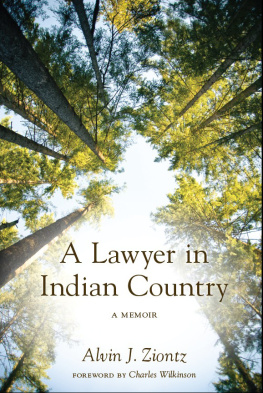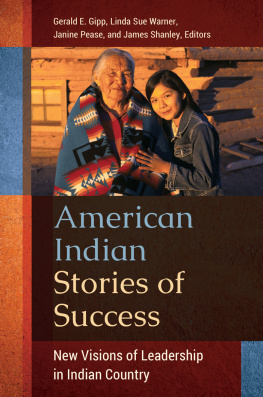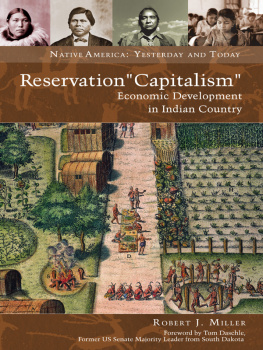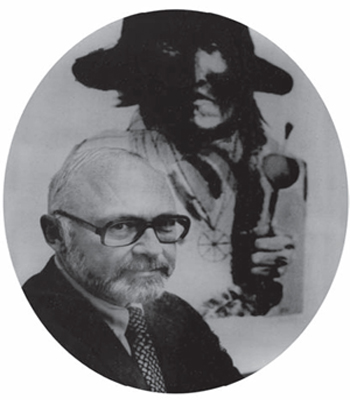All rights reserved. No part of this publication may be reproduced or transmitted in any form or by any means, electronic or mechanical, including photocopy, recording, or any information storage or retrieval system, without permission in writing from the publisher.
The paper used in this publication is acid-free and 90 percent recycled from at least 50 percent post-consumer waste. It meets the minimum requirements of American National Standard for Information SciencesPermanence of Paper for Printed Library Materials, ANSI Z39.481984.
Foreword by Charles Wilkinson
WHEN AL ZIONTZ MADE HIS FIRST DRIVE ACROSS THE OLYMPIC Peninsula to the Makah Indian Reservation in 1963 to meet with the tribal council, he had no grounding in Indian law or tribal life. He had represented members of a Makah family on miscellaneous civil matters and, out of intellectual curiosity, had done some reading on Indian law. But he had never taken a course in the field. No one hadIndian law was not taught in any law school. Most of the few lawyers representing tribes took only claims cases, where attorneys could recover contingent fees when tribes were awarded money damages for loss of their lands. Indian law was as far from the mainstream of American law as the distant Makah reservation, the northwesternmost point of the continental United States, was from American society.
Indian tribes, due to the great many treaties and other laws passed since the earliest days of the republic, have pressing needs for specialized legal representation. Their reservation lands have always been coveted by timber, mining, grazing, and other development interests. Legal work is important even when lands are not threatened by confiscation: the Bureau of Indian Affairs holds the reservations of these land-based peoples in trust, and leases and other transactions need oversight. The states have regularly attempted to exert jurisdiction over governmental functions that should be handled by tribal courts and legislatures. Special federal laws apply to Indian education, health, housing, bank accounts, crimes, and numerous other areas.
The need for legal representation was especially acute in the early 1960s, when Al Ziontz began work for the Makah. Washington and other states were aggressively cracking down on Indian salmon fishingtreaty rights, backed by the solemn promises of the United States, described by the U.S. Supreme Court as not much less necessary to the existence of the Indians than the atmosphere they breathed. As for Congress, its official policy (since discredited) was termination, that is, selling off the reservations one by one, thereby breaking up Indian societies and bringing an end to the Indian problem once and for all. Poverty-stricken tribes could rarely afford lawyers in private practice, and federal legal services programs for dispossessed peoples did not yet exist.
Although tribes lacked the resources to put it to work, Indian law held many promising doctrines. In Cherokee Nation v. Georgia, Chief Justice John Marshall emphasized the distinctive place of Indian tribes in American law, policy, and history (the relation of the Indians to the United States is marked by peculiar and cardinal distinctions which exist nowhere else), and Marshall held that the federal government had a unique and high trustee's duty to tribes.
Marshall also wrote the 1832 decision in Worcester v. Georgia, one of the great opinions in the nation's constitutional law. Indian tribes are one of the three sources of sovereignty, along with the United States and the states, in our constitutional system. In holding that Georgia could not enforce its laws within the Cherokee reservation, where Cherokee sovereignty was protected by the United States-Cherokee treaties, Marshall explained: The Indian nations had always been considered as distinct, independent political communitiesThe very term nation,' so generally applied to them, means a people distinct from others'The Cherokee, then, is a distinct community, occupying its own territory,in which the laws of Georgia can have no force.
Tribal sovereignty, as announced by our greatest jurist, with its honoring of the treaties and its promise of self-determination, took many batterings from Congress and the courts as the nation moved west. The tribes saw a steady erosion of land and a stifling of sovereign authority by the Bureau of Indian Affairs. Nonetheless, Chief Justice Marshall's opinions in the Cherokee cases remained the law, even if it went mostly unenforced. A saving grace came in 1942 when the U.S. Interior Department published Felix S. Cohen's Handbook of Federal Indian Law. Cohen, one of the country's leading legal scholars, rightly extolled tribal sovereignty as perhaps the most basic principle of all Indian law, supported by a host of decisions. Cohen's rigorous and courageous scholarship revived Marshall's vision of tribal powers.
Tribal leaders knew about Marshall, Cohen, and tribal sovereigntythe latter, like the salmon, ran in their veins. Indians were determined people, but even as late as the early 1960s they lacked an understanding of how to deal with the legislators, judges, and administrators of the literally foreign U.S. government. Then, more Indian people began graduating from college. Veterans returned home after honorable service in World War II and the Korean War. Tribal leaders began to stand up to the Bureau of Indian Affairs. In 1964, Congress enacted the War on Poverty legislation, which authorized tribesnot the BIAto administer valuable social and economic programs. Not incidentally, the poverty funds also funded offices, telephones, and plane tickets to the seat of power, Washington, D.C. By the mid-1960s, Indian country started to assert itself. With law so pervasive, the tribes had a critical need for lawyers if the burgeoning movement was to become a reality.
It is, of course, here that Al Ziontz moved into the heartland of his career. Idealistic and public-spirited, he was one of the very first private practitioners to come forward and represent tribes, which had compelling causes but little ability to pay other than minimal attorneys' fees. By the late 1960s, Ziontz was joined by a handful of private lawyers and Legal Services attorneys.






